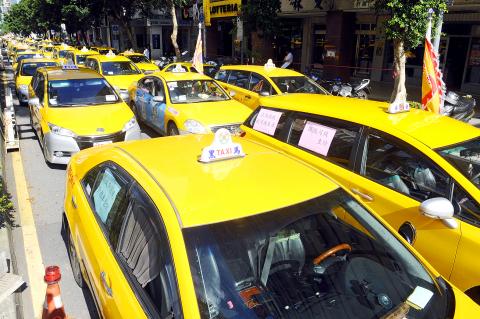Regulations on color requirements and pricing for taxis might be relaxed if a policy being considered by the Ministry of Transportation and Communications will go into effect in May amid the government’s ongoing tussle with Uber, the ministry said.
The ministry said it submitted a draft policy to the Executive Yuan last month after analyzing similar laws in Malaysia and Singapore.
If passed, taxis would be divided into normal and reserved, with normal taxis keeping their original yellow color scheme, the ministry said.

Photo: Chen Chih-chu, Taipei Times
Reserved taxi operators would be free to choose the color of their vehicles and illuminated taxi signs would not be required to be mounted on the roof or could be kept inside the car, the ministry said.
If the policy is approved, normal taxis could nearly double starting prices, the ministry said. For example, the starting price for a ride in Taipei would rise from NT$80 to NT$150.
Under the proposal, taxi operators would also be allowed to post different prices during peak and off-peak hours, but this option is to be predicated by whether a taxi can offer sufficient value in terms of car model, the ministry said, adding that vehicles would not necessarily have to be expensive Mercedes-Benzes or BMWs, but they should be relatively high-class models and not older than seven years.
The proposed scheme would also encourage taxi operators to upgrade to electronic payment methods, allowing customers to pay with credit cards before the journey and just get out at their destinations, the ministry said.
Operators with fleets of vehicles would be encouraged to design smartphone apps to allow passengers to know the model and color of the car that will pick them up, the ministry said.
The policy would offer consumers more choices and allow taxis to operate under a new management method, the ministry said, adding that it was still negotiating with taxi unions and consumer groups.

AIR DEFENSE: The Norwegian missile system has proved highly effective in Ukraine in its war against Russia, and the US has recommended it for Taiwan, an expert said The Norwegian Advanced Surface-to-Air Missile Systems (NASAMS) Taiwan ordered from the US would be installed in strategically important positions in Taipei and New Taipei City to guard the region, the Ministry of National Defense said in statement yesterday. The air defense system would be deployed in Taipei’s Songshan District (松山) and New Taipei City’s Tamsui District (淡水), the ministry said, adding that the systems could be delivered as soon as the end of this year. The US Defense Security Cooperation Agency has previously said that three NASAMS would be sold to Taiwan. The weapons are part of the 17th US arms sale to

INSURRECTION: The NSB said it found evidence the CCP was seeking snipers in Taiwan to target members of the military and foreign organizations in the event of an invasion The number of Chinese spies prosecuted in Taiwan has grown threefold over a four-year period, the National Security Bureau (NSB) said in a report released yesterday. In 2021 and 2022, 16 and 10 spies were prosecuted respectively, but that number grew to 64 last year, it said, adding that the Chinese Communist Party (CCP) was working with gangs in Taiwan to develop a network of armed spies. Spies in Taiwan have on behalf of the CCP used a variety of channels and methods to infiltrate all sectors of the country, and recruited Taiwanese to cooperate in developing organizations and obtaining sensitive information

BREAKTHROUGH: The US is making chips on par in yield and quality with Taiwan, despite people saying that it could not happen, the official said Taiwan Semiconductor Manufacturing Co (TSMC, 台積電) has begun producing advanced 4-nanometer (nm) chips for US customers in Arizona, US Secretary of Commerce Gina Raimondo said, a milestone in the semiconductor efforts of the administration of US President Joe Biden. In November last year, the commerce department finalized a US$6.6 billion grant to TSMC’s US unit for semiconductor production in Phoenix, Arizona. “For the first time ever in our country’s history, we are making leading edge 4-nanometer chips on American soil, American workers — on par in yield and quality with Taiwan,” Raimondo said, adding that production had begun in recent

Seven hundred and sixty-four foreigners were arrested last year for acting as money mules for criminals, with many entering Taiwan on a tourist visa for all-expenses-paid trips, the Criminal Investigation Bureau (CIB) said on Saturday. Although from Jan. 1 to Dec. 26 last year, 26,478 people were arrested for working as money mules, the bureau said it was particularly concerned about those entering the country as tourists or migrant workers who help criminals and scammers pick up or transfer illegally obtained money. In a report, officials divided the money mules into two groups, the first of which are foreigners, mainly from Malaysia